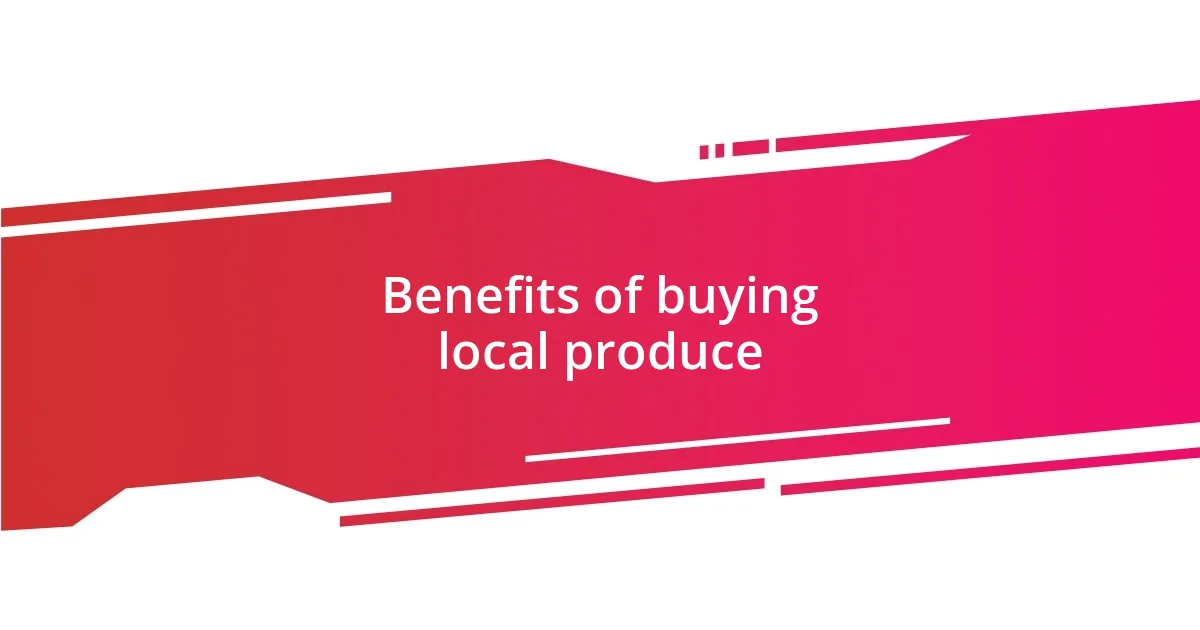Key takeaways:
- The author’s initial visit to a local farm sparked a passion for supporting local agriculture, highlighting the joy of connecting with farmers and appreciating the stories behind food.
- Buying local produce offers advantages such as freshness, economic support for the community, reduced environmental impact, and relationship-building with farmers.
- Volunteering on farms provides hands-on experience, fosters connections with knowledgeable farmers, and enhances understanding of sustainable practices while helping local food systems.

Personal journey in supporting farms
When I first visited a local farm, I was struck by the vibrant colors and fresh scents that welcomed me. It was there that I learned about the hard work and dedication farmers pour into their crops every day. Have you ever noticed how different the taste of a locally-sourced tomato is compared to one from the supermarket? That experience ignited my passion for supporting local agriculture.
I remember a particular farm that hosted an open day. I walked through the rows of vegetables, chatted with the farmer, and even got my hands dirty picking beans. The joy on the farmer’s face as they talked about their sustainable practices was infectious. It made me think, how often do we take the time to appreciate the stories behind our food?
As I started frequenting local markets, I formed connections with these farmers that made my grocery runs much more meaningful. It’s a beautiful relationship built on trust and community. Each time I support a local farm, I’m not just buying produce; I’m investing in the future of our food system. Isn’t it empowering to know that our choices can foster sustainable practices?

Benefits of buying local produce
Buying local produce offers a plethora of benefits that go beyond just the quality of the food. I recall once bringing home a basket of freshly-picked strawberries from a nearby farm. Each bite was bursting with sweetness, and I could practically taste the sunshine they had absorbed. It’s moments like these that remind me why supporting local farms is so worthwhile. Not only are we getting fresher and tastier foods, but we’re also fostering a sense of community that’s hard to replicate with mass-produced goods.
Here are some key advantages of purchasing local produce:
- Freshness: Local fruits and vegetables are generally picked at their peak ripeness, enhancing flavor and nutritional value.
- Seasonality: Buying local encourages an appreciation for seasonal eating, leading to a diverse and nutritious diet.
- Economic Support: When you buy directly from local farmers, you help boost the local economy and create jobs within the community.
- Environmental Impact: Shorter transportation distances mean a reduced carbon footprint, contributing to a more sustainable food system.
- Building Relationships: Connecting with local producers allows you to learn about their farming practices and the stories behind your food.
Each time I bring home a bag of local produce, I feel a part of something bigger—a community effort that supports healthy living and sustainable practices. It’s a small but impactful way to make a difference, one meal at a time.

Volunteering opportunities on farms
Volunteering on farms opened my eyes to an entirely different world of agriculture. I remember my first day at a community farm, digging my hands into the soil and feeling the earth’s cool embrace. There was something invigorating about working alongside the farmers, and I quickly learned how to plant seeds and care for crops in the warm sun. Every weed I pulled felt like a small victory, and the friendly banter with fellow volunteers made it all the more enjoyable. Have you ever experienced that sense of fulfillment when your hard work visibly benefits someone else’s passion?
One of the most rewarding aspects of volunteering is the opportunity to connect with seasoned farmers who generously share their knowledge. During one of my shifts, an experienced farmer taught me how to identify pests and explained their natural remedies. It was fascinating to learn how they approached the challenges of organic farming. I felt a real sense of pride when I applied this knowledge to help save a patch of struggling tomatoes. Sharing those moments with others who share the same passion for sustainable practices created lasting bonds and enriched my understanding of agriculture.
For those contemplating volunteering, I highly recommend exploring local farms that welcome volunteers. The experience is often tailored to fit various skill levels — whether you’re a novice gardener or more seasoned. You gain practical skills, an appreciation for farm-to-table efforts, and the chance to meet incredible people dedicated to preserving local food systems. There’s nothing quite like picking fresh vegetables and bringing them home, knowing you played a part in the entire process.
| Farm Type | Volunteering Opportunities |
|---|---|
| Community Farms | Regular volunteer days for tasks like planting, harvesting, and maintaining gardens. |
| Organic Farms | Hands-on workshops and training sessions on sustainable farming practices. |
| Animal Farms | Care for livestock while learning about animal husbandry techniques. |
| Educational Farms | Opportunities to assist in hosting farm tours and educational programs. |

Challenges faced by local farmers
Local farmers face numerous challenges that can affect their livelihood and the sustainability of their practices. I remember chatting with a farmer during a recent market visit, and they expressed frustration over unpredictable weather patterns. Droughts or unexpected frosts can devastate a year’s worth of hard work in mere moments. It’s disheartening to imagine how much effort goes into cultivation only for nature to throw a wrench in the plans.
The economic pressures cannot be overlooked either. Many local farmers struggle to compete with the low prices of mass-produced goods found in supermarkets. I once saw a farmer reluctantly reduce their prices at market, sharing with me the tears behind those decisions. I couldn’t help but wonder: how many passionate farmers are forced to cut corners to stay afloat? It’s a dilemma that weighs heavy on their hearts and impacts the quality of food we know and love.
Furthermore, access to resources remains a major hurdle. I’ve seen firsthand how limited access to modern technology and agricultural practices can cripple small farms. When farmers lack proper equipment or up-to-date knowledge, they face challenges in scaling their operations or improving yields. It makes me think about the importance of supporting initiatives that provide education and tools to these dedicated individuals. After all, investing in local farms means investing in our future food security.















